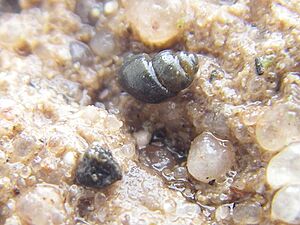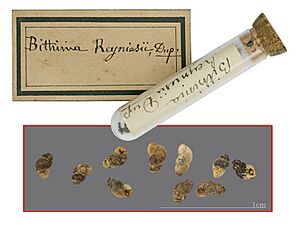Bythinella reyniesii facts for kids
Quick facts for kids Bythinella reyniesii |
|
|---|---|
 |
|
| An individual of the form compressa | |
 |
|
| Bythinella reyniesii Holotype MHNT | |
| Conservation status | |
| Scientific classification |
|
| Kingdom: | Animalia |
| Phylum: | Mollusca |
| Class: | Gastropoda |
| Subclass: | Caenogastropoda |
| Order: | Littorinimorpha |
| Family: | Bythinellidae |
| Genus: | Bythinella |
| Species: |
B. reyniesii
|
| Binomial name | |
| Bythinella reyniesii (Dupuy, 1851)
|
|
| Script error: The function "autoWithCaption" does not exist. | |
| Synonyms | |
|
Bythinella compressa (Frauenfeld, 1857) |
|
Script error: No such module "Check for conflicting parameters".
Bythinella reyniesii is a super tiny freshwater snail. It is a type of aquatic gastropod, which means it's a mollusk that moves on a "stomach-foot" – just like other snails and slugs! This particular snail belongs to a family called Amnicolidae.
Where do these tiny snails live?
These little snails make their homes in freshwater springs. For a long time, scientists thought they only lived in a few specific places, like Andorra, Austria, and parts of France. This seemed a bit strange because these places are far apart!
Later, scientists realized that many snails they thought were different species were actually all Bythinella reyniesii. This means this snail is probably much more common than they first believed. You can likely find Bythinella reyniesii across a wide area, from western Germany and nearby Belgium, all the way through central and eastern France, and into Andorra.
What do they look like?
Bythinella reyniesii are very small snails. Their shells are almost cylindrical (like a tube) and are usually just over 2 mm long. That's about the size of a tiny ant!
Scientists have studied these snails closely. They found that even though some groups of these snails were once thought to be different "species," they actually look very similar. When scientists looked at their DNA, they found almost no differences between them. This suggests that all these groups are indeed the same species, Bythinella reyniesii.
Are they in danger?
Some groups of Bythinella reyniesii were once considered "Vulnerable" (meaning they were at risk). This was because they lived in fewer than ten freshwater springs that were affected by pollution.
However, now that scientists know all these groups are the same species, the overall picture is better. Bythinella reyniesii is now classified as a "Species of Least Concern". This means that, as a whole, the species is not considered to be globally threatened. It's a good example of how understanding more about an animal can change its conservation status!
 | DeHart Hubbard |
 | Wilma Rudolph |
 | Jesse Owens |
 | Jackie Joyner-Kersee |
 | Major Taylor |


